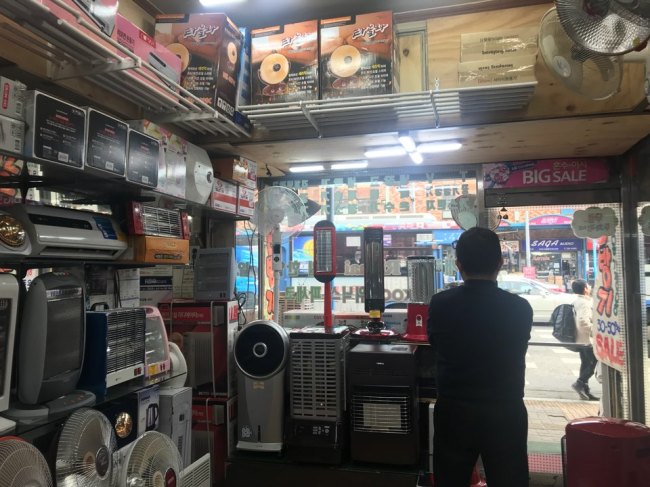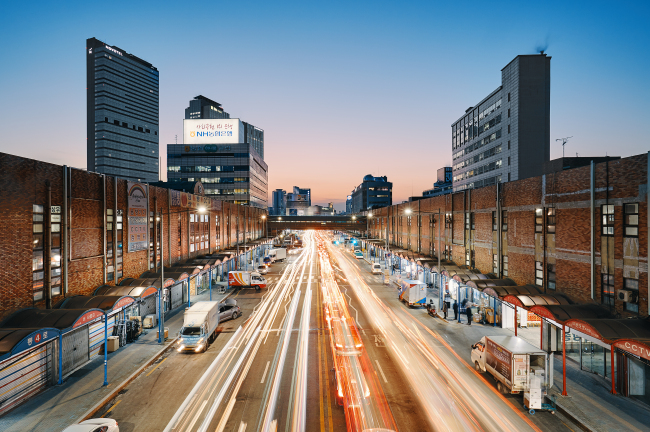[Feature] Yongsan Electronics Market struggles to stay afloat
By Bak Se-hwanPublished : April 3, 2018 - 15:22
From junk electronic parts and second-hand smartphones to high-tech household appliances and audio systems, the electronics town of Yongsan is a place where techies can find virtually anything and everything related to electronics -- or, at least it used to be.
Bae Jong-soo, the owner of a small appliances shop, has fond memories of the electronics town despite its crumbling buildings, but things have changed since he opened his business 32 years ago.
“We had pride,” he said on a recent afternoon. “We weren’t just selling electronics goods. We made the town what it is today after the 1988 Seoul Olympics. But everything here is in bad shape now.”
Bae Jong-soo, the owner of a small appliances shop, has fond memories of the electronics town despite its crumbling buildings, but things have changed since he opened his business 32 years ago.
“We had pride,” he said on a recent afternoon. “We weren’t just selling electronics goods. We made the town what it is today after the 1988 Seoul Olympics. But everything here is in bad shape now.”

He was referring to Yongsan Electronics Market, home to some of the largest electronics retailers and local computer manufacturers that began sprouting in the 1980s. Rivaling Japan’s biggest digital shopping district Akihabara in Tokyo, the sprawling market behind Yongsan Station thrived for decades, with consumers flocking to the district looking for bargains.
Fast-changing landscape
In the heart of Seoul, the district’s faded facades are in sharp contrast to the rapidly growing digital market of the country, home to Samsung and LG Electronics, two of the most recognizable digital and electronics goods manufacturers in the world.
At stake is Yongsan Electronics Market’s appeal to gadget lovers and tourists. For one thing, prices offered at the market are not as competitive as they once were, due in part to the rise of the online retail industry.
In the 1990s, the electronics district saw annual sales of over 10 trillion won ($9.4 billion). Now sales hover around 5 trillion won, despite inflation.
Fewer visitors come to see the once glitzy displays of “all sorts of things that are electronic” at over 4,000 shops housed in about 20 buildings in the district, according to Bae.
“The number of visitors has halved, so we downsized our shop to save on rent. Because we keep it small here and focus on the online market instead, tourists find the place less attractive to visit and to make purchases,” Bae added.
The emergence of giant online electronic brands has also radically reshaped the retail industry as shopping habits shift. Most of the offline store owners also sell their products online, while reducing the number of employees working at their stores.
“I wouldn’t come here myself if I were a tourist,” Bae added. “Shopping around here is not fun anymore.”

In recent years, Yongsan’s landscape has been changing fast. On Oct. 1, the country’s largest hotel and entertainment complex Seoul Dragon City, which combines four hotels, opened next to Yongsan Station.
Amorepacific, the country’s biggest cosmetics maker, moved into its new headquarters in Yongsan last year, while new residential buildings are under construction around the area.
HDC Shilla Duty Free, a joint venture between Hotel Shilla and Hyundai Development Co., has been operating 24 hours a day at Yongsan Station since 2015, with the aim of boosting the tourism industry.
The newly built landmarks, however, are of little help to their businesses, they say.
“We were told that when new hotels and duty-free shops came in that business would get better. But we lose more customers instead,” said Kim Hyun-jin, 53, a computer parts seller who does business with nearby computer shops.
“We are located a 15 minute-walk from Yongsan Station. There are few buses that come through the electronics town. All the good things are at the station, but the rent is too expensive for small retailers like us,” Kim said. “It’s as if there’s a concrete wall separating the train area and here.”
Addressing challenges
Nowadays, retailers use the town as “a warehouse,” according to electronics shop owners interviewed by The Korea Herald.
“At my shop, I stack up boxes of new printers, faxes and telephones,” said retailer Park Jae-hyun, 53. “I don’t expect customers at my shop, so it’s convenient this way. People buy them online, I deliver them from here.”
Park said many have either turned their shops into warehouses, where they keep their goods until they sell them online, or moved to other areas, including the Gasan digital complex in western Seoul, where the rent is less expensive.
According to Seoul City’s data, the district’s electronics buildings have an over 22 percent vacancy rate, as of 2018 -- a rate not expected in the past.
“They say it’s Korea’s Akihabara. Then at least run more bus services to the area so that people know we sell stuff here,” smartphone seller Yu Sang-hyun said. “Another thing Seoul City could do is promote the electronics town to foreign tourists at the station or at the new hotels.”
To address concerns over the area, the Seoul Metropolitan Government on Tuesday unveiled a set of new measures to help keep the place as a hub of the offline electronics market.
The fact that the electronics district is near Yongsan Station, a major transportation hub in Seoul where high-speed railways and two subway lines run, add to city officials’ motivation to capitalize on the area.
The 20 billion-won ($19 million) project, which is part of Seoul’s urban planning to renovate declining and underserved areas, is set to rebrand the electronics market into a hub for the “fourth industrial revolution” -- more specifically, for high-tech startups, 3-D printing service providers and educational programs, according to the city.
The rebranded electronics market, or Y-Valley, will enjoy “new glory days” as a haven for new innovation, according to Seoul Mayor Park Won-soon, as the city has pledged to turn it into a place similar to Boston’s Innovation District in the US by 2022.
Electronics shop owners hope that the city will consult with them as it moves to rebrand the area and, most importantly, that it will move in a way to restore their businesses.
“The regeneration plan should pay attention to our realities here. Why not support us by lowering the rent?” printer retailer Park Jae-hyun said.
“This is a town of our own making. I would miss it if I had to move to a new area.”
By Bak Se-hwan (sh@heraldcorp.com)

















![[KH Explains] Hyundai's full hybrid edge to pay off amid slow transition to pure EVs](http://res.heraldm.com/phpwas/restmb_idxmake.php?idx=652&simg=/content/image/2024/04/18/20240418050645_0.jpg&u=20240418181020)

![[Today’s K-pop] Zico drops snippet of collaboration with Jennie](http://res.heraldm.com/phpwas/restmb_idxmake.php?idx=642&simg=/content/image/2024/04/18/20240418050702_0.jpg&u=)